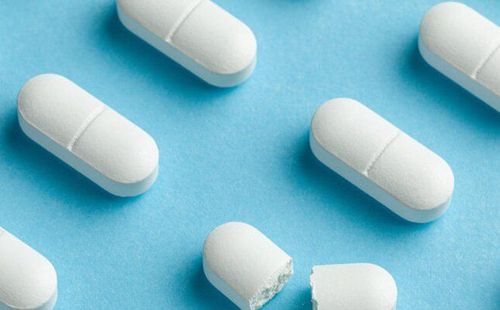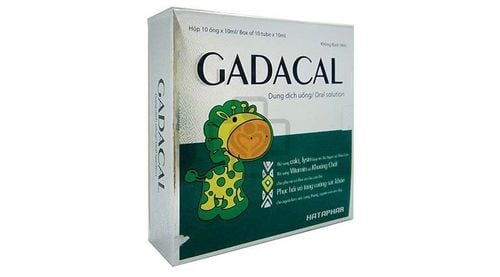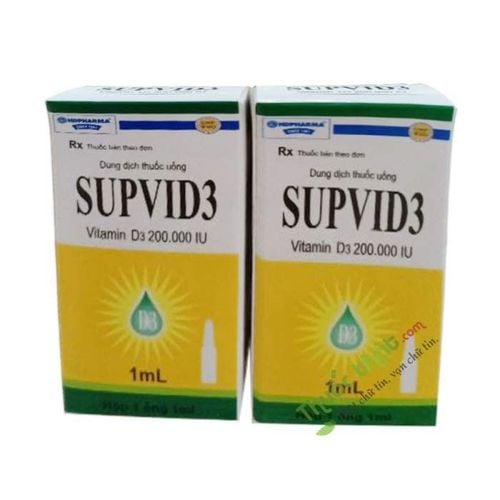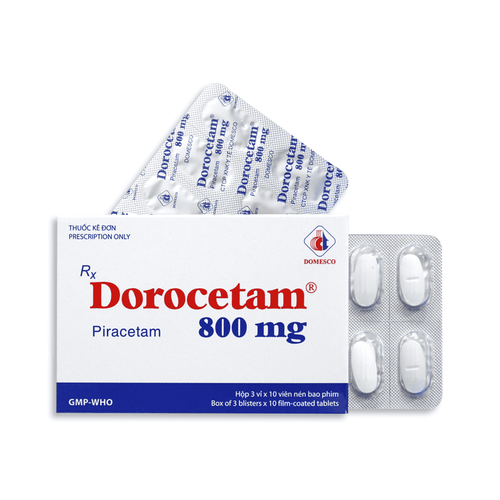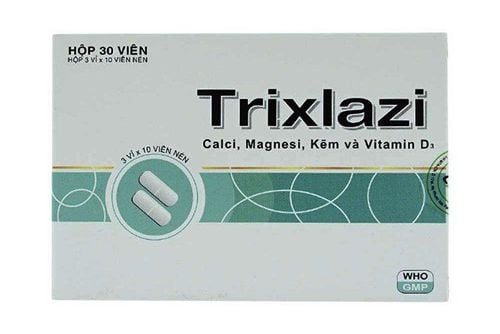This is an automatically translated article.
Cholecalciferol is vitamin D3 often indicated in cases where vitamin D supplements are needed. Readers can follow the article below to know the effects and how to supplement vitamin D?
1. What is Cholecalciferol?
Cholecalciferol (Vitamin D3) is a fat-soluble vitamin, which is the active form of vitamin D that the body can use directly without going through a metabolic step. Vitamin D3 stimulates the absorption of calcium and phosphate from the small intestine, promotes the excretion of calcium from the bone marrow into the circulatory system, promotes the reabsorption of phosphate in the renal tubules, is an essential element for the development of bones and teeth. and several other organs in the body. Without vitamin D, the body will have to take calcium from the bone marrow, making bones weak and brittle, increasing the risk of osteoporosis.Although vitamin D is necessary but cannot be synthesized by the body, the active form of vitamin D3 is synthesized only when the skin is exposed to sunlight. Sunscreen, sun-protective clothing and people who work in low-light environments need to use synthetic vitamin D3.
Once inside the body, Cholecalciferol binds to cells to regulate the absorption of calcium and phosphorus from food. The drug is fatty acid soluble and requires bile acid action. Finally excreted in feces.
2. Indications of the drug Cholecalciferol
Cholecalciferol is indicated in the following cases of patients who need vitamin D supplementation:
People who work regularly and continuously in a dimly lit environment. The patient is malnourished and the diet is deficient in calcium. Patients cannot synthesize vitamin D for themselves. Patients who are comatose or paralyzed must lie still in place.
3. Contraindications of Cholecalciferol
Do not use Cholecalciferol in the following cases:
Hypercalcemia. Patients with primary hyperparathyroidism. Malignant disease. Williams syndrome. Note when using Cholecalciferol drug:
Using high doses of Cholecalciferol continuously for a long time can cause side effects such as constipation, loss of appetite and fatigue. Use with caution in patients with elevated levels of calcium and phosphorus in the blood. In obese individuals, increased vitamin D accumulation in adipose tissue increases the risk of vitamin D deficiency, so use high doses but with caution for toxicity. Use of Cholecalciferol in patients with impaired renal function should be closely monitored. Pregnant women need to provide enough vitamin D for the development of the fetus, but avoid using large doses. The drug can pass into breast milk and provide vitamin D3 for the development of children. Under normal diet and activities, lactating women do not need to supplement vitamin D. No drug interactions of Cholecalciferol have been detected, but before combining with any other drug, you should consult. doctor's opinion.
4. Dosage and usage
How to use:
Cholecalciferol is prepared in the form of capsules, tablets or oral solution with different concentrations depending on the needs of use. Adult dosage
Prevention of osteoporosis: Take 20-25mcg/day. Vitamin D deficiency due to less exposure to light or poor absorption of calcium in the intestine: Take 15-25mcg/day. Dosage in children
Prevention of vitamin D deficiency rickets: 10mcg/day in infants. 15 mcg/day in children and adolescents. Severe vitamin D deficiency, symptoms: Take 50mcg/day in infants for 6 weeks, then maintain 10-25mcg/day; Take 50mcg/day for children and adolescents for 8 weeks. Then maintain 15-25 mcg/day. Nutritional rickets: Take 50 mcg/day for 3 months in infants, then maintain 10 mcg/day. Children take 75 - 150 mcg / day for 3 months, then maintain 15 mcg / day. Teenagers take 150mcg/day for 3 months. Then maintain 15 mcg/day. Dosage is for reference only, depending on the condition and condition of the patient, there are different dosages prescribed by the doctor.
5. Side effects of drugs
Some undesirable effects may be encountered when using Cholecalciferol:
Excessive use can increase calcium in the blood. Nausea, vomiting, constipation and anorexia. Thirst and increased urination. Fatigue and mood swings. Anaphylactic reactions and itchy rash. Above is all information about Cholecalciferol drug, patients need to carefully read the instructions for use, consult a doctor / pharmacist before using. Absolutely do not arbitrarily buy Cholecalciferol for home treatment because there may be unwanted side effects.





